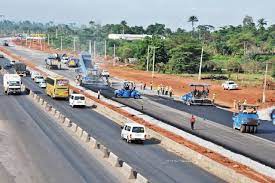The 127-kilometre Lagos-Ibadan Expressway, Nigeria’s busiest highway which has been undergoing rehabilitation/reconstruction since 2013, was perhaps the most challenging highway for all stakeholders in 2022.
Commuters, travellers, motorists, the construction companies handling the project, traffic regulatory agencies and other stakeholders have stories to tell.
Hardship caused by gridlock, accidents, petroleum tankers fires, loss of man hours and other problems brought harrowing experiences.
This was most felt around construction zones on section one of the project which spans Ojota in Lagos to the Sagamu Interchange.
Mrs Gloria Faisal, a resident of Sparklight Estate, Arepo, said she abadoned her car for over 10 months due to congestion and confusion caused by gridlock as a result of construction works and reckless driving.
Mr Anayo Valentine, a commercial bus driver who plies the Ojodu Berger to Magboro axis, said transporters hiked fares by almost 1,000 per cent due to time wasted in gridlock.
At some point, traffic regulatory and law enforcement agencies were overwhelmed by reckless driving of impatient drivers who drove against traffic to escape hours in gridlock.
They also helplessly allowed motorcades of the top echelon of the society who joined in the recklessness.
Many residents and business owners on the axis had to go for the dangerous option of taking multiple commercial motorcycle rides through the confusion to beat deadlines.
Relief came on Dec. 12, when the Federal Ministry of Works suspended construction works and removed all barriers and diversion points around construction zones on section one of the project.
According to the Director, Federal Highways, South West, Mr Adedamola Kuti the construction work was not completed but the highway was re-opened to ensure smooth rides during the festive season.
He said that the contractors were expected back on site in January, announcing a new completion date of March, 2023.
Kuti explained that some unforeseen circumstances including heavy rainfall prevented the initial December, 2022 delivery date from being a reality.
To many, the easing of traffic that followed the suspension of work and removal of barriers was a respite.
The Lagos State Chairman of the Nigerian Union of Journalists, Mr Adeleye Ajayi expressed relief at the development.
He appealed to the Federal Government to utilise the dry season to meet its newly set completion deadline of March 2023 on the highway before the rainy season.
A fruit trader in Mowe, Malam Abdullahi Inuwa, said that the free flow was positively impacting businesses, and he could now freely move between various markets in Lagos and Ogun to restock.
On Dec. 17, the Federal Controller of Works in Ogun, Mrs Forosola Oloyede, followed suit and supervised removal of all crash barriers and diversion points on section two of the project which spans Sagamu Interchange to Ojoo in Ibadan.
She cautioned motorists not to be tempted to drive above speed limit as a result of the smoothness of the road.
Motorists are appealing that hardships of 2022 should not be allowed to return on the road in the new year when contractors return to site to complete the project in 2023.
Contractors handling both sections of the highway have given a March 2023 completion date for the project.
Fashola, however, during an appearance of Channels Sunrise Daily on Dec, 21, added a caveat to the delivery date, giving new insights on factors to determine completion date.
The Minister hinted that the Federal Government had “deliberately reserved the last six kilometres“ of the project, which were the most difficult aspects of the construction, for the last stage to minimise impact of the works on road users.
He noted that the hardships on the highway and other ongoing projects were “bitter pill for a better life’’.
Fashola explained that when the contractors return to site in January 2023, they would complete work on the bridges and interchanges.
He said that they might, however, be slowed down by Oyo State government’s construction of a major drainage around Ojoo which would to pass through the Lagos-Ibadan Expressway project.
“On the Ibadan end, the Oyo State Government is constructing drainage channel across the highway, we need that drainage channel to be constructed before we finish the road otherwise it will mean completing the road and then the Oyo State government coming to cut it again.
“So we need the drain and we need the road and they must come in a sequence. so these are the challenges of construction that we face and sometimes, just unforeseen challenges, costs just go up, supply chain is broken somewhere.
“With the best of commitment, we intend to finish before the end of this term,’’ he said. (NAN)


